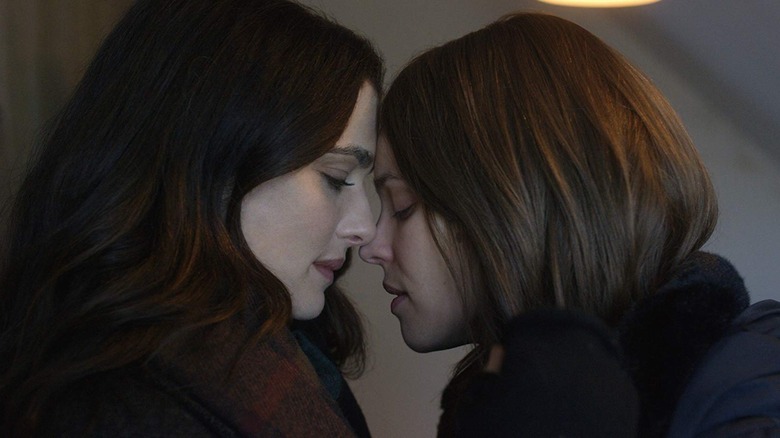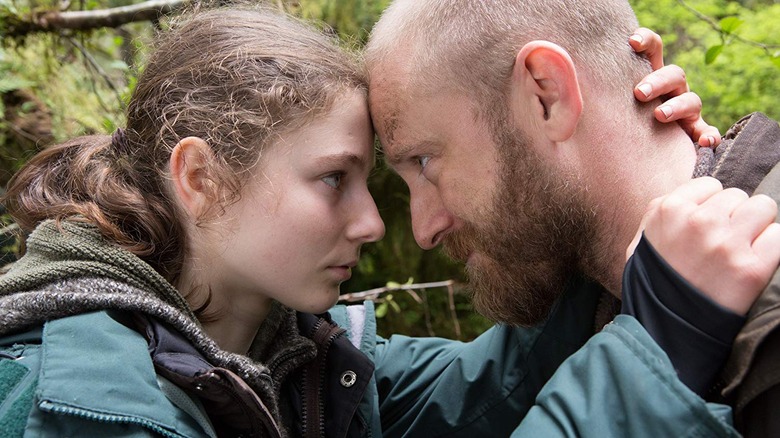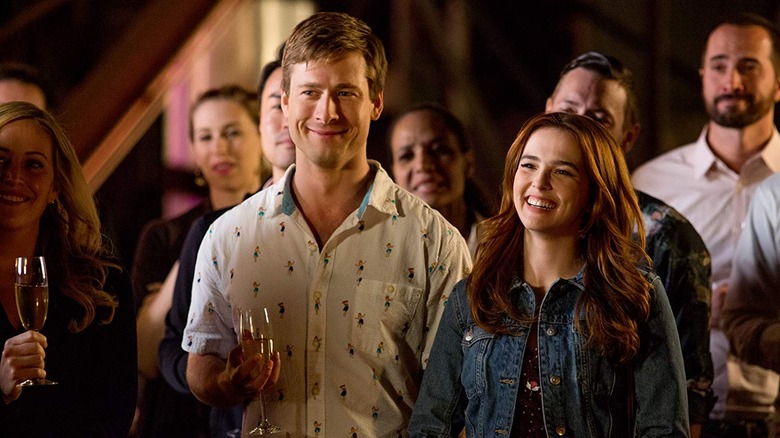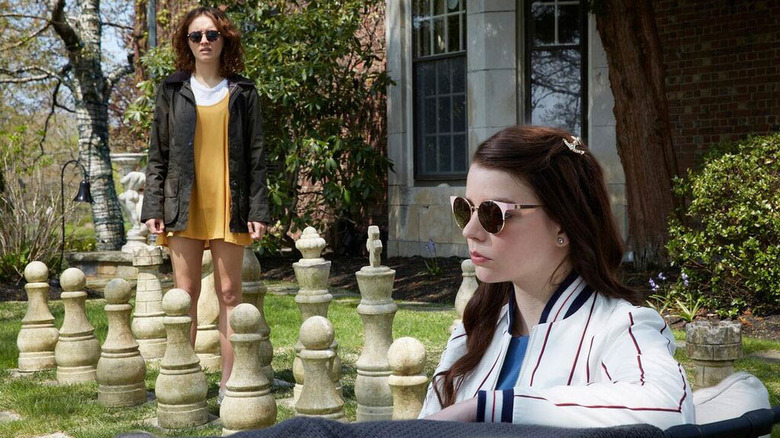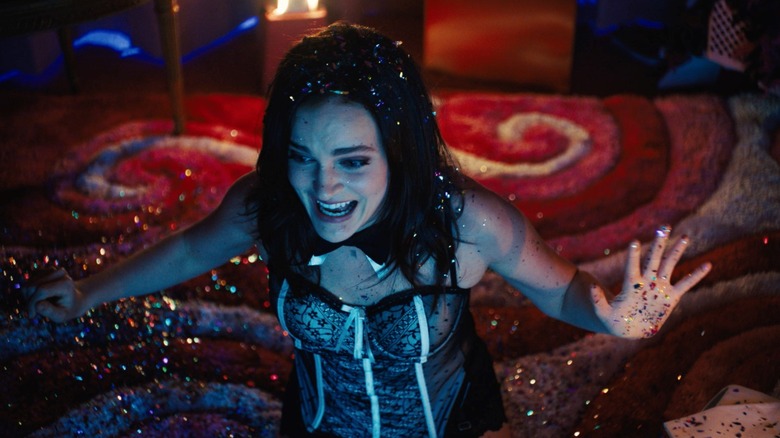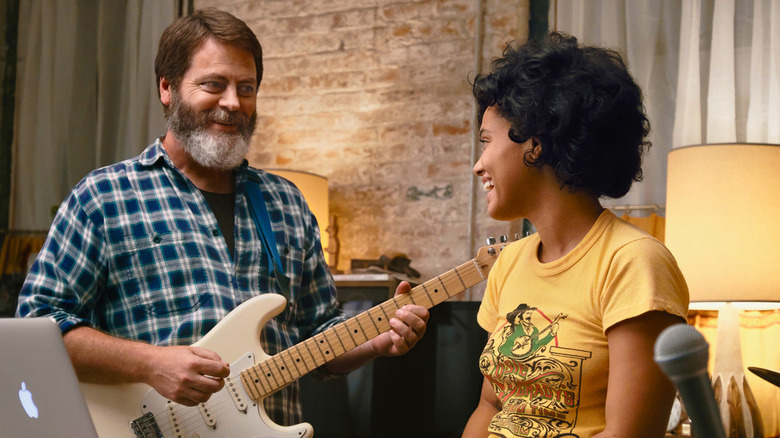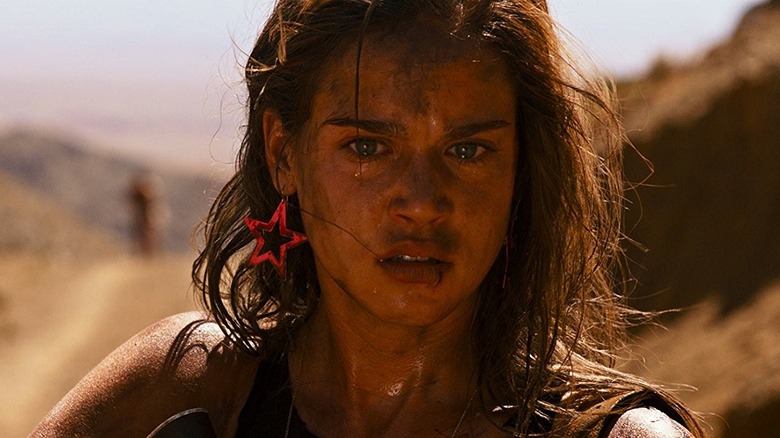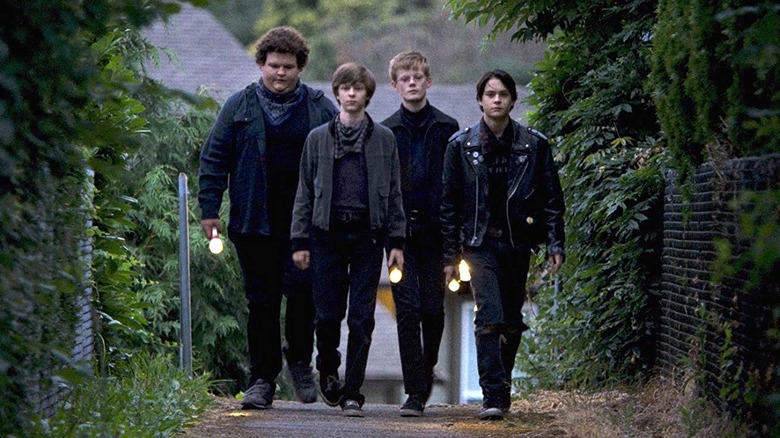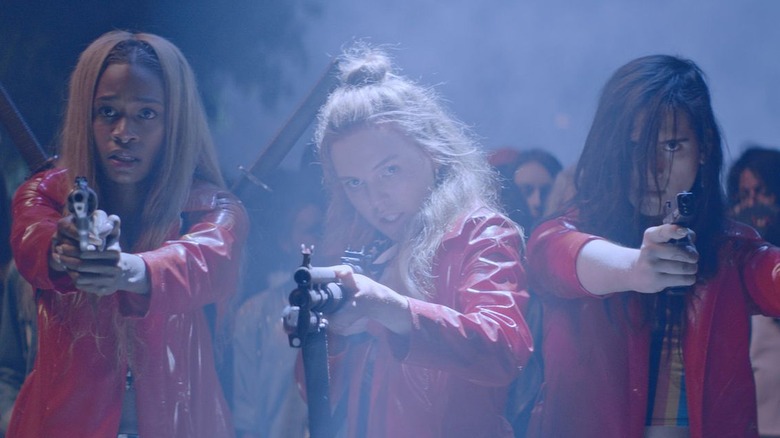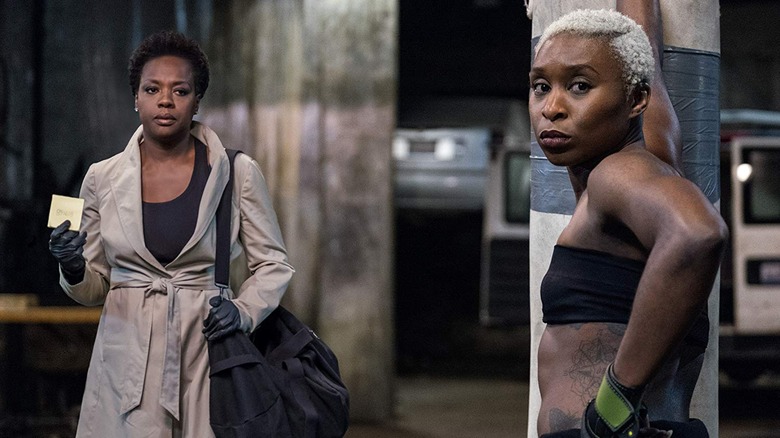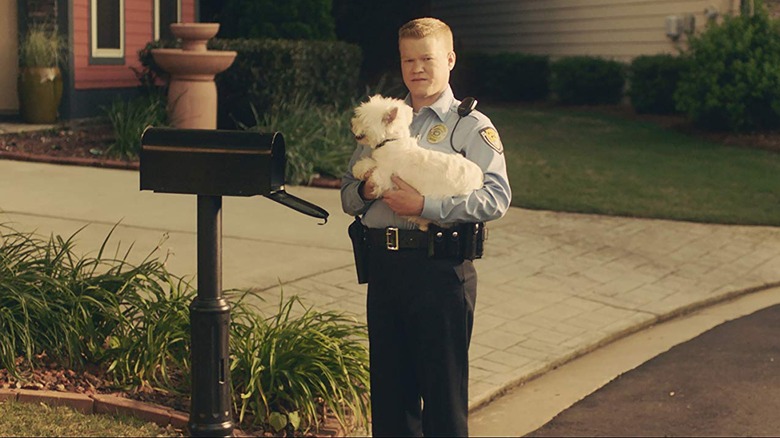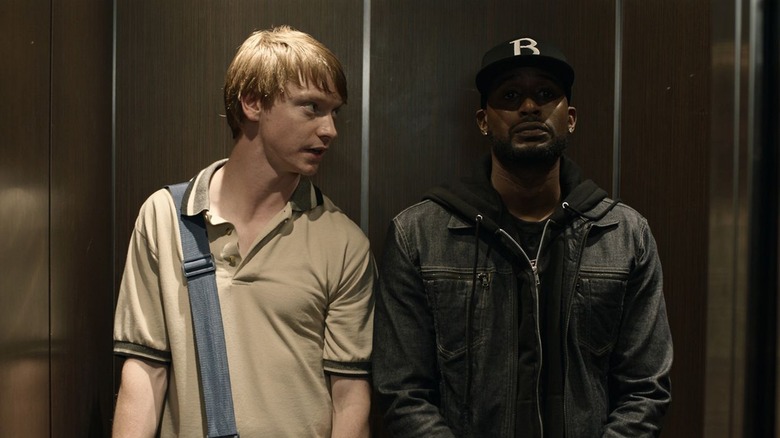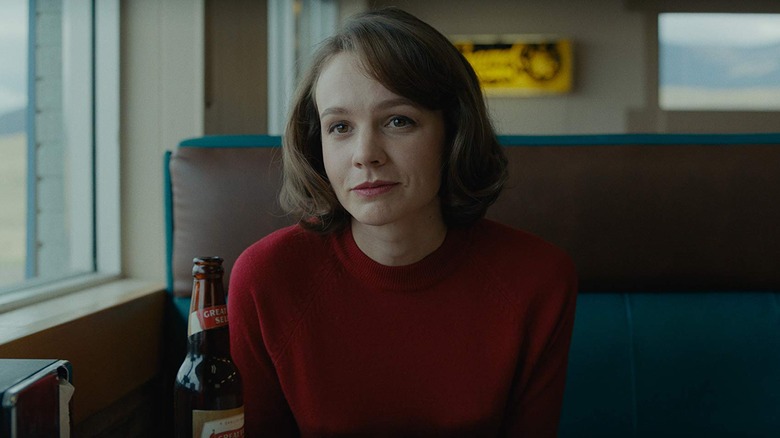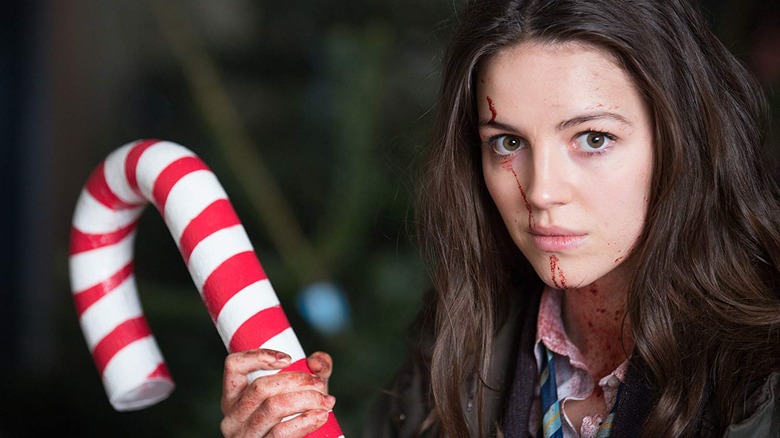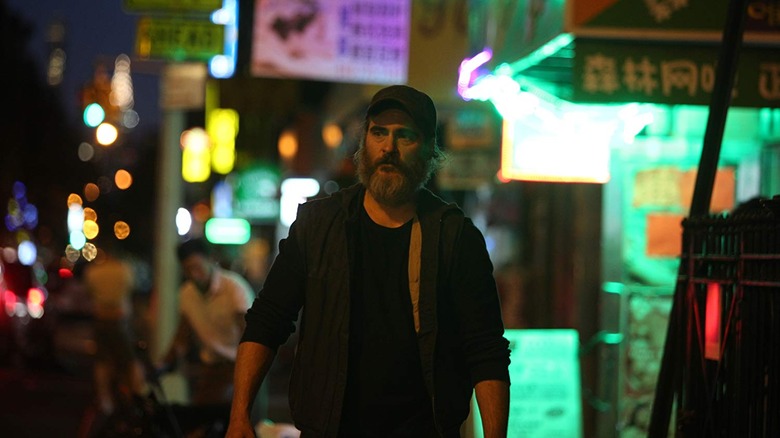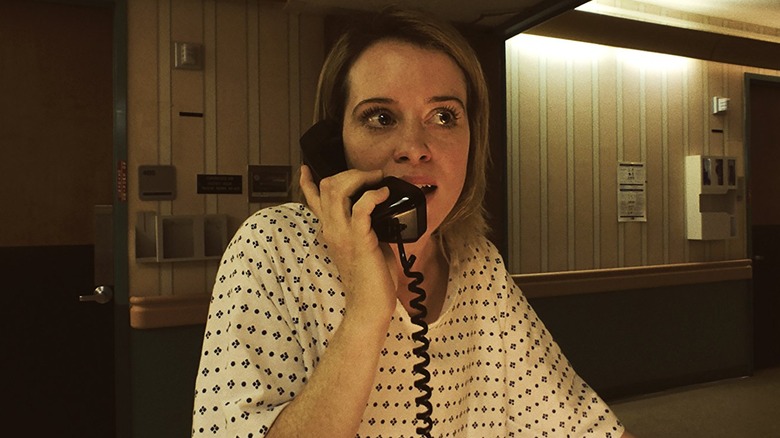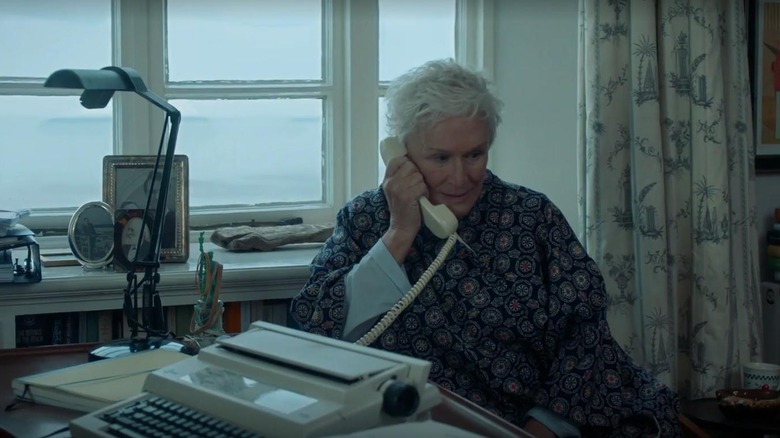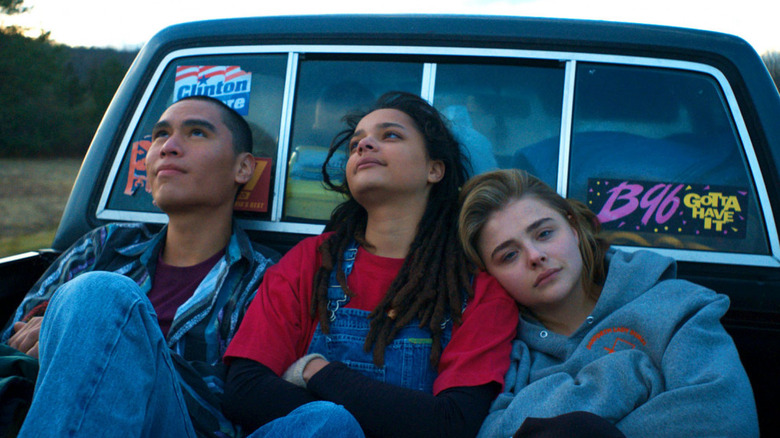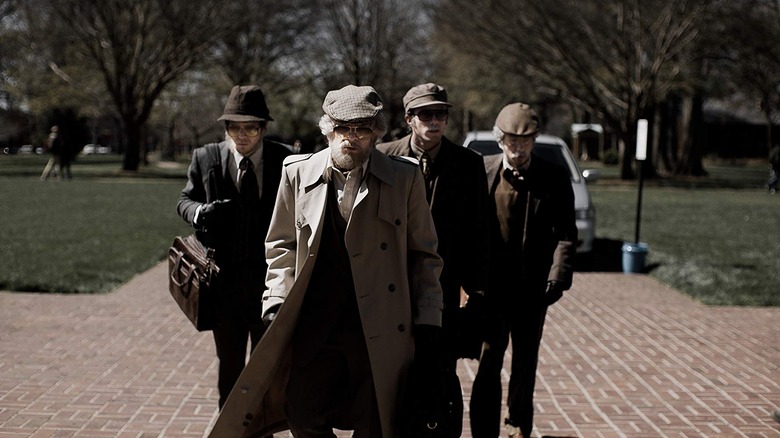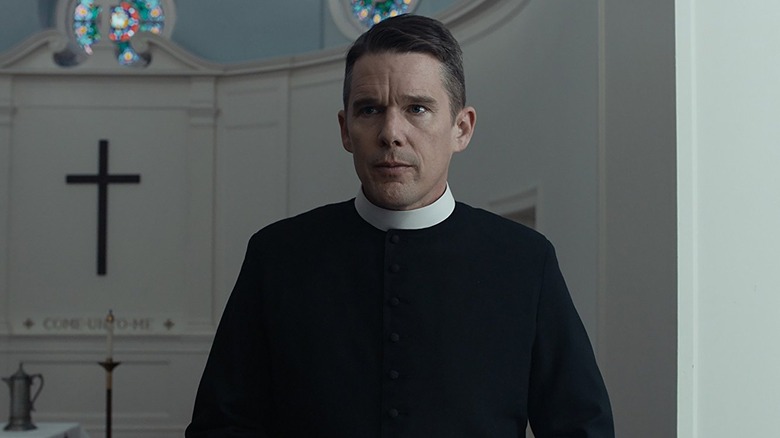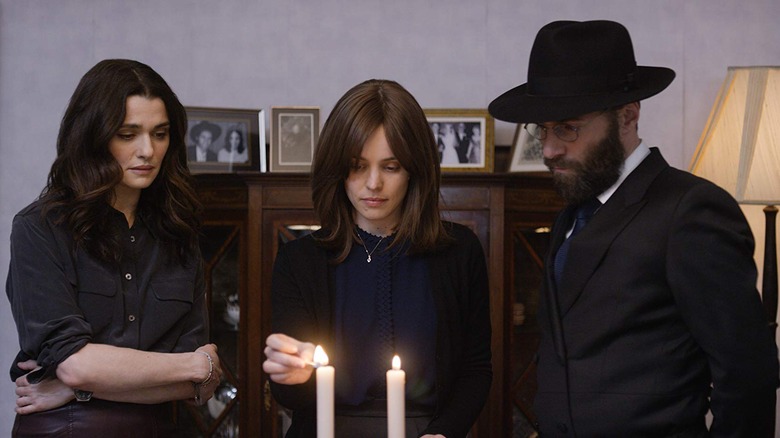Hidden Gem Movies You Missed In 2018
2018 has been an insanely good year for movies, by anybody's estimation. Whether you're a fan of horror, comedy, or action, big budget blockbusters or tiny indies, there was something to get excited about. With such a wide variety of films on offer, however, it's only natural certain things would get lost in the fray. Even formulating a list such as this one requires careful consideration.
"Best Of" lists are one thing (and they're usually mulled over for weeks, if not months, by eager critics), but advising movie fans of what to catch up on is a huge responsibility. The following 20 films aren't just some of the best of 2018. They're the kinds of movies that will stand the test of time, and that will stick with you long after the New Year has unleashed its crop of hopeful upstarts. Before 2019 rolls around, catch up with this lot.
Leave No Trace
Debra Granik's quiet, unassuming study of a father-daughter relationship in disrepair made little noise this year outside hardcore cinephile circles. Her film had to be sought out, meaning it was annoyingly out of reach for many multiplex-dwellers. The follow up to her breakthrough, Winter's Bone (which launched the career of one Jennifer Lawrence) stars hugely undervalued character actor Ben Foster as a PTSD-addled father living off-grid with his teenage daughter (Kiwi actress Thomasin McKenzie, in a career-defining role).
The film showcases the beauty of the natural Pacific Northwest in its first act before transitioning to a more normal family setting as the happy duo are uprooted by well-meaning child services agents. Critics were floored, with Empire's Ian Freer describing the film as, "a sympathetic, affecting, beautifully realised portrait of lives lived on the margins," while The New York Times' Manohla Dargis opined, "neither actor begs for your heart, but each — like this movie — takes it."
Set It Up
The rom com is definitely not dead if 2018 is anything to go by. Aside from To All The Boys I've Loved Before (which put an Asian-American teen front and center) and blockbuster mega-hit Crazy Rich Asians, Netflix gifted us Set It Up. Starring super-cool up-and-comers Zoey Deutch and Glen Powell, reuniting after appearing in Richard Linklater's bro-comedy Everybody Wants Some!! together, and written and directed by a couple talented ladies (Katie Silberman and Claire Scanlon), the flick sees the two leads playing overworked P.A.s to mega-bosses Lucy Liu and Taye Diggs.
Realizing their lives would be a lot more manageable if their jobs weren't so all-encompassing, the duo decides to play matchmaker — with disastrous results. They also, naturally, fall in love along the way. The Washington Post's Bethonie Butler called Set It Up, "one of the best movies on Netflix (or anywhere else)" in her review. Critic Amy Nicholson, writing in Rolling Stone, went even further, crediting the flick with resurrecting the modern rom-com. Nicholson claimed its empathy, "might be what defines the next era of romantic comedies."
Thoroughbreds
Anya Taylor-Joy and Olivia Cooke hatch a murderous scheme to get rid of a horrid stepfather in writer-director Cory Finley's darkly stylish debut. The clothes are to die for (no pun intended), while the interiors and landscapes are both lovingly shot — particularly when the blood starts spilling. This dark comedy also boasts the best reference to Swimfan this side of... well, okay, it's probably the first one ever.
Thoroughbreds is also notable for including the final appearance of the dearly departed Anton Yelchin, who passed away tragically in 2016 at the age of just 27 after his Jeep rolled down a driveway and crushed him. The young character actor gives another rousing performance here as a sad sack wannabe criminal outsmarted by two teenage girls.
The Guardian's Peter Bradshaw heralded Cooke and Joy for being "convincing in their ruthlessness," describing the terrifying duo as "Stepford sisters in the cause of self-gratification." Over at Empire, Andrew Lowry suggested this "could be the last outing for its leads before superstardom beckons."
Cam
Sex work tends to be presented negatively in films, if it even features at all. But, with an ex-camgirl penning the screenplay, there was no danger of that happening with Cam, a Netflix horror movie from the combined efforts of director Daniel Goldhaber and writer Isa Mazzei.
But as Mazzei wrote on Twitter, reviews often didn't give her due credit: "I wrote the film. Don't say 'writer/director Daniel Goldhaber with former sex worker Isa.' Yes I'm a former sex worker. I'm also a writer." Madeline Brewer (Janine on The Handmaid's Tale) stars as a popular cam-girl looking to expand her empire, who's horrified to learn someone has stolen her identity (and her business, as a result).
Writing in The New York Times, Jeannette Catsoulis argued that Cam upends "the typical thriller trope of the sex worker as helpless victim," by featuring a cam-girl "with smarts and agency." In Slate, Inkoo Kang pointed out the film's topical nature, claiming "at the intersection of an industry that didn't exist a decade ago and an ageless trade that's seldom portrayed candidly in popular culture, the film finds stakes—and a resolution—whose freshness is hard to understate."
Hearts Beat Loud
Everybody's favorite grumpy Dad, Ron Swanson (aka Nick Offerman), plays a musician and record store owner/single father to a wannabe doctor (Kiersey Clemons) who's right on the cusp of university when the two write a catchy pop-rock song (the same one that gives the film its title) together. He wants her to stay so they can be a band; she wants to spread her wings.
Their sweet, tender relationship is sensitively teased out by director Brett Haley, who co-wrote the script with Marc Basch. Elsewhere, Clemons' romantic relationship comes in the form of American Honey breakout star Sasha Lane, for whom she might just consider hanging around, in a nice twist on the usual boy-meets-girl, girl-might-stay-after-all trope.
Hearts Beat Loud is such a quiet little film it passed most people by, but critics went cuckoo for the sweet, atypical relationships at its core. Writing for RogerEbert.com, Tomris Laffly described how the flick "gently charts the last days of this parent-daughter's togetherness pre-college, as both of them learn to let life take its course." The Guardian's Peter Bradshaw, meanwhile, pointed to its "unassuming indie charm," describing it as a "likable heartwarmer" that is "very decently acted."
Revenge
2018 was a massive year for women in horror, from Jamie Lee Curtis taking on Michael Myers 20 years later (Halloween) to Jenn Wexler becoming the first female director to open Frightfest with The Ranger. Following in the footsteps of 2017's female-helmed and fronted cannibal movie Raw, Coralie Fargeat's Revenge made another claim for the French as the purveyors of modern genre fare for women. Her debut feature, which she wrote and directed, stars Matilda Lutz as an abused woman out for, well, revenge against the men who wronged her.
The film is notable primarily for turning the much-maligned rape revenge sub-genre on its head. Empire's Helen O'Hara praised the movie as such, writing, "this is not a radically different rape revenge drama on the surface, and it is still, at times, as unpleasant a watch as any of its fellows. But Fargeat's clear eye, direct moral stance and comfort with violence make it a punchier entry than most." Variety's Scott Tobias, meanwhile, called Revenge "the closest thing to a feminist rape-revenge tale since Abel Ferrara's Ms. 45" — high praise indeed.
Summer of 84
Stranger Things super-fans rejoice! Those hoping for something a bit darker from the denizens of Hawkins can look to Summer of 84 for their fix. The sophomore feature from RKSS (aka François Simard, Anouk Whissell, Yoann-Karl Whissell) following the brilliant Turbo Kid, follows a group of kids in a sleepy town who believe a local do-gooder cop is also secretly the serial killer that's been terrorizing the community for years.
RKSS build the tension slowly, meaning Summer of 84 seems at first like a Goonies-esque kids adventure movie, before ratcheting everything up in the final act to an explosive, blood-curdling finale. "It's hilarious, uncomfortable, original, and the start of something new in what had, until now, been a saltily comic retread: It's scary," gushed Alan Scherstuhl in the Village Voice. Elsewhere, The Hollywood Reporter's John DeFore noted, "mystery-wise, the film teases viewers pretty effectively, with plenty of jolts that suggest the boys are on the right track balanced by other signs they're making something out of nothing."
Assassination Nation
Movies don't come much angrier than Assassination Nation, writer-director Sam Levinson's sexy and topical take on being a teenager in Trump's America. Evoking The Purge movies in its hyper-violence and slick utilization of the American flag, the flick features a foursome of bad-ass teenage girls (Odessa Young, Suki Waterhouse, Abra, and trans actor Hari Nef) whose world is turned upside down when a hacker leaks the private data of the entire town of Salem (see what they did there?) and holds them as the culprits.
The New York Times' Aisha Harris praised the film for bluntly calling out "all-American misogyny," describing it thusly; "it is difficult to watch, but feels true to the spirit of the cultural climate, in which women are routinely shamed and silenced for outspokenness, or simply existing." Empire's Andrew Lowry heralded Levinson's movie for skewering toxic masculinity, stating emphatically, "the Trump era has its first dorm-room classic."
Widows
Widows should have been the biggest action movie of the year. Sure, Tom Cruise jumped out of a plane (again, snore), but Steve McQueen's reboot of the British TV series of the same name finds Viola Davis, Elizabeth Debicki, Michelle Rodriguez, and newcomer Cynthia Erivo (making her transition from stage to screen in her very first film role) taking on a gaggle of male crooks after being left to clean up their deceased husbands' messes. The emotionally-charged, wincingly violent, and proudly female-focused film takes on a genre dominated by men and eviscerates it.
Vulture's David Edelstein described Widows as a, "stark, violent, cynical but thoroughly entertaining caper picture," while A.O. Scott wrote in The New York Times that it's, "a fascinating and sometimes frustrating hybrid, a film that tries both to transcend and to exploit its genre. It works best when Davis commands the screen with her inimitable blend of psychological subtlety and operatic intensity."
Game Night
Studio comedies have taken a major hit recently, but in the sub-genre of movies with extremely literal titles (Fist Fight, Tag, Night School, et al), Game Night is a refreshingly strange oddity. The premise finds Rachel McAdams and Jason Bateman's couple holding a game night for their friends and, looking to spice things up, indulging in some murder mystery escapades.
A worthy ensemble cast is filled out by Irish actor Sharon Horgan, giving good side-eye as a bemused newcomer, and Jesse Plemons as the weirdo neighbor constantly holding his fluffy dog (fun fact: the same pooch stars in Widows alongside Viola Davis) who desperately wants an invite to the party.
Empire's Amy West heralded the film's anarchic energy, noting, "Game Night isn't just after mindless laughs. Rather than resorting to slapstick it boasts a witty, razor-sharp screenplay and a fleshed out story." While AP's Lindsey Bahr admitted that "attempting to explain why a comedy works is a kind of futile exercise, but this group of actors just works together. They have an easy chemistry."
Bodied
Joseph Kahn's caustic, and frequently laugh-out-loud funny Bodied sees Disney alum Calum Worthy in a career-making performance as a woke Columbia college student who gets involved in the world of underground battle rap. Kahn co-wrote the script with Alex Larsen, a real-life battle rapper, and cast several non-actors to add to the film's authenticity. The result is an often shocking take on a character who, depending on your perspective, is either saying what everybody is thinking or way out of line.
Uproxx's Vince Mancini championed the flick's no-nonsense approach to difficult conversations, noting, "Everything sounds better as a rhyme, and Bodied uses this phenomenon to cheat without shame. It works. When's the last time you had a conversation about race, privilege, and political correctness that was actually fun?" Vulture's Bilge Ebiri, on the other hand, argued, "Kahn... doesn't try to fancy things up stylistically. ... The artistry here lies in the mutations and permutations of language and rhythm that are spoken onscreen."
Wildlife
The directorial debut of beloved character actor Paul Dano, Wildlife, is an adaptation of the novel of the same name by Richard Ford. Dano wrote the script with his partner and frequent collaborator Zoe Kazan, and the result is a quietly affecting feature. Carey Mulligan and Jake Gyllenhaal play the troubled parents of a teenager living in Montana. Rather than using the expansive countryside to show the bridging gap between the couple, Dano sends Gyllenhaal off for most of the picture, leaving Mulligan to cope by herself.
Wildlife is a wonderful calling card for Dano-as-director, and Gyllenhaal is assured in a less showy role than he's accustomed to, but this is Mulligan's film through and through. Vulture's David Edelstein described the film as, "a major moment" for the British actress, while The Wall Street Journal's Joe Morgenstern wrote, "Mulligan shows her character no mercy, at least on the surface; her performance is startling, and for the most part unsparing."
Anna and the Apocalypse
The zombie musical/Christmas horror/teen drama you didn't know you wanted, Anna and the Apocalypse is one of those movies that encompasses a million different things but never stretches itself thin. Originally envisioned as "High School Musical with zombies," the flick stars young actress Ella Hunt as the titular character, a teenage girl dealing with boys, school, and her protective father when the zombie apocalypse strikes.
In her review for Indiewire, Amy Nicholson noted the movie, "plays on every emotion — to use a musical analogy, it's a skeleton whacking its ribs like a xylophone" and "it's a serious accomplishment that [director John] McPhail manages to make the audience... tear up in the film's last third." RogerEbert.com's Monica Castillo said the film "is a gift for the midnight movie crowd that's just as liable to break out into song as to celebrate each major zombie kill. It's one of those rare horror movies to leave you with good holiday cheer."
You Were Never Really Here
You would be hard pushed to find a more compelling or devastating film released this year than Lynne Ramsay's You Were Never Really Here. Starring Joaquin Phoenix as a no-good type doing underground jobs for money while struggling with PTSD and routinely trying and failing to kill himself, it's also arguably the purest distillation of what it feels like to deal with debilitating depression. Phoenix is an exposed, raw nerve of a character, with life passing him by as he refuses to interact meaningfully with anybody or anything.
Critics rallied around Ramsay's film, with The Irish Times' Donald Clarke describing it as a, "revenge nightmare for the ages," and "a numbed-psychosis masterclass," that means "Ramsay can stake a reasonable claim to being the best British film-maker of her generation." TIME's Stephanie Zacharek echoed these sentiments, writing, "to watch it is to see a rigorous and intensely creative filmmaker at work. No wonder Ramsay's name doesn't make it onto a lot of female-director lists. ...She's a list unto herself."
Unsane
It's been a massive year for Claire Foy, with the Crown actress making her mark on the story of Neil Armstrong in First Man and taking on the mantle of Lisbeth Salander in The Girl in the Spider's Web. Her biggest moment this year, however, was in Stephen Soderbergh's trippy, stalker-themed pscho-thriller Unsane. Shot on iPhones, the flick spends most of its time right up in Foy's face as her character finds herself confined to an insane asylum where her stalker (played by The Blair Witch Project's Joshua Leonard) just so happens to turn up, too. The British actor is in virtually every second of screen-time and she owns every moment, never overplaying it or resorting to screaming histrionics.
Writing for Uproxx, Amy Nicholson notes the film, "isn't quite a thriller. That would imply a coherent villain. Instead, it swipes through themes like an Instagram filter. ...and mutates to become a #MeToo allegory about a woman screaming to be heard." Indiewire's Ben Croll noted Soderbergh leans "in to each lurid new twist to keep the film a perversely pleasurable ride."
The Wife
There were a lot of movies jostling for attention this year, but it was unsurprising when the Golden Globes nominations dropped and the iconic Glenn Close was recognized for her role in The Wife. Close plays the, you've guessed it, wife to Jonathan Pryce's philandering novelist in this study of grief, long-term relationships, and the perils of talent. Meanwhile, the still-gorgeous Christian Slater stars as a nosy reporter trying to figure out the secret to this seemingly perfect couple's success (he hasn't aged a day since Heathers).
Vulture's Emily Yoshida noted how natural the central couple is, writing, "Pryce and Close convey a truly lived-in, complicated familiarity with each other." The A.V. Club's Katie Rife, meanwhile, advised that "it's Close's wonderfully subtle characterization of Joan that lifts The Wife above its cliché setups and neat role reversals, which is really rather ironic. Once again, it's the wife doing all the hard work. At least this time, she gets top billing."
The Miseducation of Cameron Post
The method of "deprogramming" gay teens is, shockingly, still a thing in 2018. The Miseducation of Cameron Post, the sophomore feature from bisexual filmmaker Desiree Akhavan, tackles the landscape of a gay conversion camp with a light touch. Chloe Grace Moretz stars as the titular character, who gets sent off to be "cured" after being discovered having sex with her girlfriend in a car during Prom. Akhavan, adapting the novel of the same name by Emily M. Danforth alongside co-writer Cecilia Frugiuele, focuses primarily on her heroine's experience.
The New York Times' A.O. Scott praised Cameron Post for resisting "the straight and narrow," noting that, "confident in its beliefs and curious about what makes its characters tick, [the film] is more interested in listening than in preaching." TIME's Stephanie Zacharek, meanwhile, pointed out how Moretz's performance as the titular character, "suggests how long-term defensiveness can cause a kind of internal bruising that doesn't always show."
American Animals
Part documentary, part feature film, writer-director Bart Layton's American Animals is unlike anything else released this year. Charting the exploits of four young men looking to rob some rare books from their college library, either out of boredom or necessity, the flick splices in footage of the real-life criminals with reenactments starring the high-profile likes of Evan Peters, Blake Jenner, and Barry Keoghan.
The result is a truth-defying oddity that leaves even its participants puzzled over the reasoning behind their exploits. The Guardian's Peter Bradshaw admitted he, "was utterly absorbed in this teeth-clenchingly exciting story," noting "the heist sequence itself stands up really well. ...It really does feel authentic." Likewise, Empire's Ian Freer described American Animals as, "sharp, smart, often bravura filmmaking, a terrifically entertaining mix of fast facts and pulp fiction. But beneath the flash is a sad story of teens who feel their lives simply aren't good enough."
First Reformed
Nobody was expecting the new film from Paul Schrader (Taxi Driver) to be a laugh riot, but even by the notoriously downbeat filmmaker's standards, First Reformed is tough. Starring Ethan Hawke as a priest losing his faith, and possibly dying slowly, who is contacted by a pregnant wife (played by Amanda Seyfried, who was really pregnant at the time of filming) when her hubby starts displaying odd behavior concerning the impending end of the world.
The New York Times' A.O. Scott described the film as "an assertion of order in the face of chaos, an effort to organize something that is by its very nature an unholy mess: one person's life." TIME's Stephanie Zacharek noted the movie's "understated triumph lies in its casting. ... Hawke conveys both the selfishness and the true anguish of people who just can't let go of their own pain. But he also offers a shred of hope in the idea that in the end, caring too much might be just the thing that saves us."
Disobedience
Chilean director Sebastián Lelio's follow-up to the Oscar-nominated A Fantastic Woman takes on anther facet of LGBT life as he turns his attention to an Orthodox Jewish community in London and the woman it cast out for being a lesbian. Rachel Weisz is Ronit, who returns home following the death of her father to find her ex-lover Este (Rachel McAdams) is married to a man — their mutual best friend from childhood, Dovid (sensitively played by Alessandro Nivola).
Writing in TIME, Stephanie Zacharek opined, "in Disobedience, three people reckon with the cost and meaning of freedom. Everybody pays. But if it were free, what would it be worth?" AP's Lindsey Bahr echoed her thoughts, writing, "McAdams and Weisz are on fire... showing sides to their talents that we've never seen before in this truly unique film. Disobedience might not look like it's for everyone on the surface, but its specificity is what makes it worthy."
